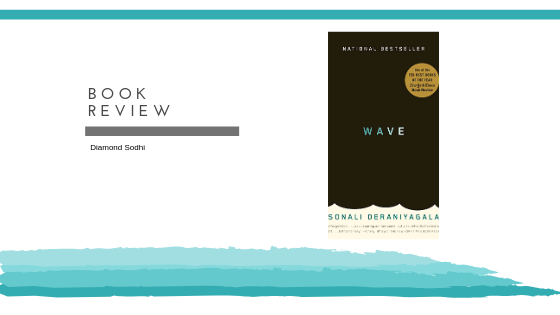
Wave, a Memoir by Sonali Deraniyagala was a book I did not want to read. But I had to, for adding up my grades [Haha!]. Okay, so I did read it finally, but I pre-decided not to think about the story of Sonali losing her husband, two young boys and parents in a Tsunami during a family vacation in Sri Lanka in 2004. I just couldn’t see the point in piling up accounts of grief and tremendous sorrow to my not so blithesome life.
In the opening pages of her book, she along with her family is seen faced with a fearful race against time to get away from a Tsunami fast chasing them. Her maternal instincts at securing the safety of her children take over the safeness concern for her parents in the moment of sudden disaster, although her mind repeatedly punishes her for not shouting an alarm at them and inadvertently leaving them to their devices. A bruised Deraniyagal, the only survivor in the family, grapples with the painful thought of the death of her children, husband, and parents, with a fragile hope of their survival, taking the reader forward through the opening pages, to discover whether her family survived the catastrophic torrent or not.
Mentally strong [and physically too for having survived being washed away], she looks for evidence of their death and at the same time is not able to bring herself to face the news of their death. Deraniyagala’s character is paradoxical, with denialism and insistence to live in the moment fighting for supremacy in her mind. Her resentment borders bitterness towards the Tsunami survivors, including regret over being alive herself. She is seen questioning the ‘law of luck’ favorable to some, accentuating her loss of comprehension at why her family had to be the doomed one when they could have been one of the lucky survivors. Her initial years have been depicted as a disaster at dealing with the catastrophe.
She struggled with herself to stay away from everything that freed from darkness the memories she had kept undercover. She didn’t step into her home in London for years, took on to alcoholism, and even tried to hoodwink her pain by playing out an out of character insanity. For years she disassociates from her life she was too afraid to confront for the evidence of the life she cherished. However, with the passage of many years, she probably realizes that staying away was adding
on to the feeling of isolation from what she still had.
But what was it that she still had despite everything being gone? Most think of it as the ‘haunting of the past’. I have a self-propounded theory for the haunting experienced by the author and all those who’ve ever been through a deep sense of loss, specifically, in terms of the death of a loved one. After losing someone that stood before us in flesh and blood just a while ago, our emotional dissonance grows louder. Our intense emotions for someone close to our heart is an ‘energy’ that exists between us. With the death of the loved one, the energy is still pulsating within us- it’s breathing and alive. but the physical form is gone. This dissidence becomes a harrowing ordeal and we try to escape the conflicting emotions by pulling ourselves away from the experiences that send up the recognition of this void.
That’s what Deraniyagala did too- she first evaded and then went back in search of the ‘energy’ that still must’ve been playfully straying in the backyard of her home, sleeping between her boys’ pile of clothes, hiding within the pages of her husband’s diary, and sprawling around her parents’ barren house in Sri Lanka. She apparently felt the need to end the disengagement and re-enter the physical world for evidence of the life they
shared, craved to bond with the past, filling herself with the energy that she knew would be present there.
In her book from thereon, she artfully recreates the scenes of a blissful life with her family as she revisits those moments with the reader. She goes over every shred of memory and searches for the bygone years in every corner of the sad and empty house- perhaps, with the hope of something about them still there- unfelt, unvisited. That energy must still be waiting for her to come and feel it, breathe it, bond with it, and take it with her to keep it alive within her, and perhaps immortalize it in the form of a memoir.
Strange as it is! At some point in time, we are too afraid to ‘confront the life that has been lost’ yet at some time later we try to’ find life in what had been lost.’
